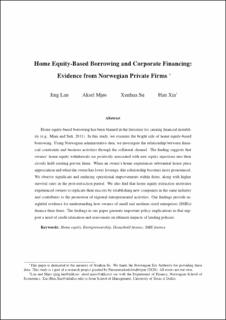| dc.description.abstract | Home equity-based borrowing has been blamed in the literature for causing financial instability
(e.g., Mian and Sufi, 2011). In this study, we examine the bright side of home equity-based
borrowing. Using Norwegian administrative data, we investigate the relationship between financial
constraints and business activities through the collateral channel. The finding suggests that
owners’ home equity withdrawals are positively associated with new equity injections into their
closely held existing private firms. When an owner’s home experiences substantial house price
appreciation and when the owner has lower leverage, this relationship becomes more pronounced.
We observe significant and enduring operational improvements within firms, along with higher
survival rates in the post-extraction period. We also find that home equity extraction motivates
experienced owners to replicate their success by establishing new companies in the same industry
and contributes to the promotion of regional entrepreneurial activities. Our findings provide insightful
evidence for understanding how owners of small and medium-sized enterprises (SMEs)
finance their firms. The findings in our paper generate important policy implications in that support
a need of credit relaxation and assessment on ultimate impacts of lending policies. | |
